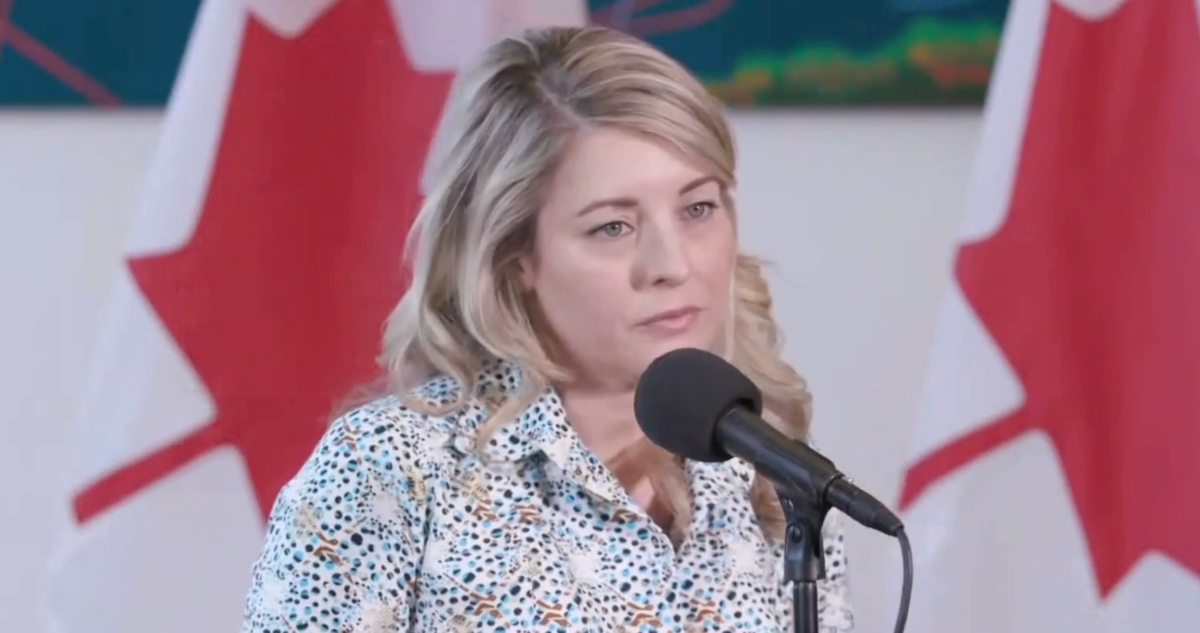Global Affairs Canada (GAC) drafted statements admitting that Canada has no official definition for “non-lethal” military goods, confirming that one of the Trudeau government’s central talking points on arms exports to Israel amounted to little more than misleading spin.
However, the ministry never shared that admission with journalists when directly asked for the government’s definition of “non-lethal” military goods in February.
When Israel began its brutal war on Palestinians in Gaza a year ago, Foreign Affairs Minister Mélanie Joly insisted that only “non-lethal” military goods were being sold by Canadian suppliers to Israel. The government also claimed that no “full weapon systems” were being exported.
Those claims were immediately questioned by arms monitoring groups, who pointed out that no such category for “non-lethal” goods exists in Canada’s export control regime or in the Arms Trade Treaty, of which Canada is a signatory. They noted that the term could refer to components in deadly military hardware, or goods that enable the operation of such equipment.
Staff at GAC were well aware that the term “non-lethal” carries no official meaning, and drafted media lines confirming as much, documents obtained by The Maple through an access request show.
In response to media questions about what the government meant by “non-lethal” military exports, a senior communications advisor at the ministry prepared a table of proposed talking points, including one line that stated: “There is no established government wide definition of non-lethal equipment, and these terms are intended to take their commonly accepted dictionary meanings.”
The drafted line does not appear to have been sent to any journalists.
Communications staff at the ministry prepared the responses for multiple news outlets, including The Maple, amid questions about military export permits that the federal government had authorized during the first two months of Israel’s war on Gaza.
The line was never sent to The Maple, and the line does not appear to have been quoted by other publications.
The documents show that the drafted lines were shared with Joly’s office and other officials for approval. Days later, a series of new media lines were approved by Joly’s office without any mention of the term “non-lethal” and its lack of an official definition.
The Maple asked the ministry why the original lines were never released to the media, and if it accepted that the admission undermined one of the government’s central talking points on the issue. No response was provided.
The ministry stopped publicly using the “non-lethal” talking point around March, when the Trudeau government paused approvals of new military export permits.
Kelsey Gallagher, a researcher with the arms monitoring group Project Ploughshares, said the admission comes as no surprise, since there is no codified definition of “non-lethal” goods in Canadian military export regulations. He noted that all military goods enable lethal operations in some way.
“Given the level of humanitarian harm being witnessed in Gaza and now the wider Middle East, I think it’s entirely inappropriate for the Canadian government to politicize messaging on this issue in such a way that it misleads the public,” he explained.
“If the intention was to mislead Canadians regarding the threat posed by Canada’s continued arming of Israel, then I think that goal was achieved.”
Gallagher noted that the government’s “non-lethal” line was repeated in Canadian media reports, in many cases without scrutiny or pushback.
The Trudeau government’s spin efforts also extended to an attempt at interfering with the government’s transparency obligations.
As previously revealed by The Maple, political staff attempted to insert the Trudeau government’s “non-lethal” talking point into a package of documents on military exports to Israel that the ministry was required to release under access law. Ministry staff then lied when questioned by The Maple about the spin attempt.

The attempted spin was ultimately not included in the package of documents after government staff raised concerns that doing so would be inappropriate.
Growing Calls
Canada has faced growing calls from United Nations experts, international human rights groups, aid organizations and members of Parliament to immediately cancel all military trade with Israel. The Trudeau government paused approvals of new export permits in March following a non-binding motion passed in the House of Commons, but stated that existing permits would remain valid.
In August, The Maple reported that the U.S. State Department had named the Quebec-based company General Dynamics Ordnance and Tactical Systems as the principal contractor in a “possible” $83 million sale of mortar cartridges to Israel. Weeks later, Joly said the deal would be blocked and that around 30 existing military export permits had also been “suspended” over the summer.
At the time, Gallagher, the arms monitoring expert, noted that suspending a permit is not the same as cancelling it outright.

It is not clear how many military export permits for sales of goods to Israel remain active. Over the summer, the Standing Committee on Foreign Affairs and International Development (FAAE) released four batches of documents that provided limited information on active military export permits with Israeli end users, most of which were arms dealers.
Analysis by The Maple found that of these, 216 permits had expiry dates after the date of this story’s publication. It is not clear whether or not the permits listed in the FAAE documents include the approximately 30 permits that Joly claims to have suspended.
The lack of details provided by Joly also means it is not clear what types of goods were being transferred under the cancelled permits.
In a recent interview with National Post columnist John Ivison, Canada’s UN ambassador Bob Rae paraphrased Canada’s position as being that it will “support Israel’s defensive needs, but we will limit other particular kinds of exports.” He did not elaborate further.
In July, The Maple reported that four companies asked to participate in a lawsuit about Canadian weapons exports to Israel. The lawsuit was filed against the federal government in March by Canadian Lawyers for International Human Rights, which argues that Canada’s military exports to Israel are illegal and must be stopped.
The companies — TTM Technologies, General Dynamics Land Systems-Canada, GeoSpectrum Technologies and Excelitas — asked for orders to keep details of their export permits confidential or stated their intention or potential intention to seek such orders.
Alex Cosh is the news editor of The Maple.









